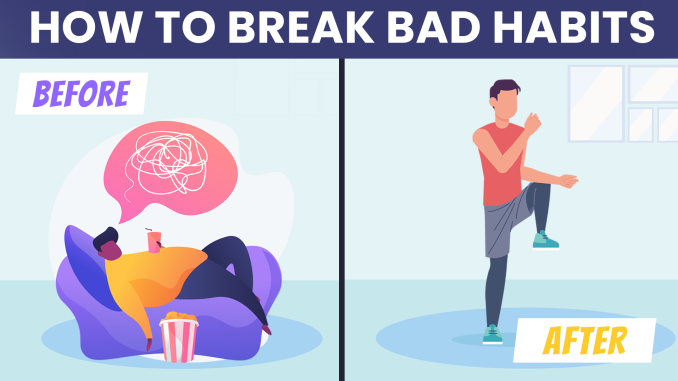
We all have habits—some helpful, others not so much. Whether it’s biting your nails, overeating junk food, procrastinating, or spending too much time on your phone, unhealthy habits can quietly take a toll on your well-being. The good news is that change is possible. With the right mindset and strategies, you can break unhealthy habits for good and build a healthier, more intentional life.
Understanding the Root of a Habit
Habits form through a loop of cue, routine, and reward. A cue triggers a behavior, the routine is the habit itself, and the reward reinforces it. For instance, stress (cue) might lead you to snack on sweets (routine) because it makes you feel better temporarily (reward). Identifying these components is key to changing any habit.
Take a few days to track your behaviors and notice patterns. What time of day does the habit occur? What emotions or situations trigger it? This awareness is the first step in gaining control.
Set Clear and Realistic Goals
Breaking a habit requires intention. Instead of vague resolutions like “I want to be healthier,” create specific, actionable goals. For example:
-
Replace “I want to stop eating junk food” with “I will replace afternoon chips with a piece of fruit.”
-
Change “I need to stop procrastinating” to “I’ll use a 25-minute timer to stay focused on tasks.”
Realistic goals are easier to stick to and help you track progress.
Replace, Don’t Just Remove
One of the biggest mistakes people make is trying to stop a habit without offering their brain an alternative. If you’re giving something up, what will you do instead? Your brain craves the reward, so replacing the routine while keeping the reward is a powerful strategy.
For example:
-
If you’re trying to stop scrolling social media at night, replace it with reading a book or journaling.
-
If smoking helps you relax, try deep breathing or taking a walk to achieve a similar calming effect.
Start Small and Be Consistent
Change doesn’t happen overnight. Trying to overhaul your life in one week will likely lead to frustration and relapse. Instead, focus on one habit at a time and build from there.
Small, consistent changes are more effective than grand but short-lived efforts. If you want to cut back on sugar, start by eliminating soda rather than trying to quit all sugary foods at once.
Use Triggers to Your Advantage
While some triggers initiate bad habits, others can help you build better ones. Use positive cues to prompt the behavior you want. For example:
-
Leave workout clothes by your bed as a cue to exercise in the morning.
-
Set an alarm to remind yourself to drink water every hour.
Environment also plays a huge role. If you want to eat healthier, keep fruits and vegetables visible and junk food out of reach.
Build a Support System
Accountability increases the likelihood of success. Share your goals with a friend or join a group focused on similar changes. Encouragement, advice, and a sense of community can help you stay motivated.
Additionally, consider professional help if needed. Therapists, coaches, or support groups can provide tools and insights that accelerate your progress.
Don’t Rely on Motivation Alone
Motivation is helpful but not always reliable. Some days you’ll feel inspired, but on others, you might struggle. That’s where discipline and routine come in. Create systems and schedules that support your goals, even when your motivation dips.
Automating habits—for example, preparing healthy meals in advance or scheduling workouts—can reduce decision fatigue and make it easier to stay on track.
Expect Setbacks—And Learn from Them
Change is rarely a straight path. You may slip up, but that doesn’t mean you’ve failed. What matters most is how you respond to setbacks. Instead of being discouraged, use the experience as a learning opportunity.
Ask yourself:
-
What caused the relapse?
-
How can I avoid this trigger in the future?
-
What adjustments can I make to my strategy?
Progress is about consistency, not perfection.
Celebrate Your Wins
Positive reinforcement is crucial. Acknowledge your achievements, no matter how small. Whether it’s a week without smoking or successfully replacing soda with water, celebrate your efforts. Rewards can be simple—a relaxing bath, a night out, or a new book—anything that reinforces your new behavior.
Conclusion
Breaking unhealthy habits isn’t easy, but it is absolutely possible with the right approach. Start by understanding the patterns behind your behavior, set realistic goals, replace negative habits with positive ones, and build a support system to keep you on track. Change takes time, patience, and self-compassion. But with consistent effort and the right mindset, you can let go of habits that no longer serve you—and build a life that reflects your healthiest, happiest self.